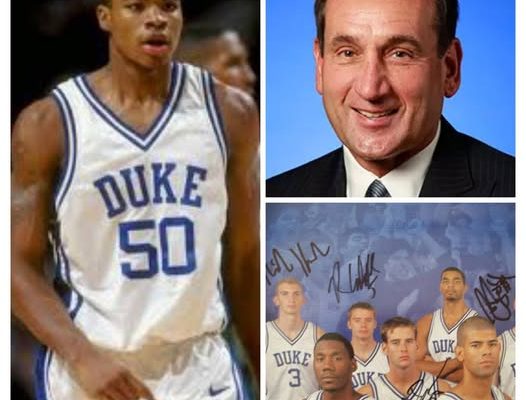**The Team That Time Can’t Touch: How Duke’s Forgotten Dynasty Nearly Changed Basketball Forever**
Before the world obsessed over Zion Williamson’s rim-rocking dunks or Coach K’s five national titles, there was a time—a golden, electric, almost mythical time—when Duke Basketball was on the brink of doing the impossible. A time when perfection felt within reach. A time when legends collided, the court shimmered with destiny, and history nearly bent at the knees for a Blue Devil dynasty that most fans today barely talk about. But if things had gone just slightly differently, Duke might have finished as the greatest college team of all time. Yes, even better than the undefeated ’76 Indiana Hoosiers.
This is the story of Duke’s forgotten dynasty—the back-to-back championship teams of 1991 and 1992, and the near-mythical 1999 squad that could have rewritten history. These were teams that didn’t just win; they transcended. They played with a swagger that made the game feel like art, a symphony of motion, precision, and cold-blooded execution. And yet, for all their brilliance, they remain underappreciated in the broader narrative of college basketball’s greatest eras.The 1991 team wasn’t supposed to be legendary. They weren’t the most talented group Coach K had ever assembled, at least not on paper. But they were something far more dangerous—they were relentless. Christian Laettner, still a year away from his iconic shot against Kentucky, was already a force. Bobby Hurley, the baby-faced assassin at point guard, ran the offense with the poise of a 10-year NBA vet. Grant Hill, then a freshman, was a glimpse into basketball’s future—a 6’8” wing who could handle, pass, and defend like a guard.
What made this team special wasn’t just their talent; it was their ruthlessness. They played with a chip on their shoulder, a collective snarl that said they knew they were better than you, and they were going to prove it. In the NCAA Tournament, they dismantled teams with surgical precision, culminating in a championship game blowout of a powerhouse Kansas squad. It wasn’t just a title—it was a statement.If 1991 was the arrival, 1992 was the coronation. This team was even better—deeper, more confident, and historically dominant. Laettner, now a senior, had evolved into the most hated (and most clutch) player in America. Hurley was the engine. Hill was the X-factor. And then there was the supporting cast: Thomas Hill, Brian Davis, Cherokee Parks—all guys who would have been stars on lesser teams but embraced their roles in the pursuit of something greater.
And then, of course, there was *The Shot*. The Kentucky game. The one that still plays on highlight reels 30 years later. Laettner’s turnaround at the buzzer wasn’t just a moment—it was the exclamation point on a team that refused to lose. When they crushed Michigan’s Fab Five in the title game, they didn’t just win back-to-back championships; they staked their claim as one of the greatest teams ever assembled.But the true “what if?” of Duke’s dynasty came seven years later. The 1999 team was a juggernaut unlike anything college basketball had seen in years. They were stacked: Elton Brand, the National Player of the Year. Trajan Langdon, the Alaskan Assassin. Shane Battier, the ultimate glue guy. William Avery and Corey Maggette, future NBA talents. They steamrolled through the season, losing only once—a meaningless February game to Cincinnati.
They were supposed to win it all. They were supposed to be *perfect*. And then, in the most shocking upset in NCAA title game history, they ran into UConn. A great team, yes, but not *this* Duke team. Not a team that had outscored opponents by an average of 17 points per game. Not a team that had future pros at every position. Yet in one night, it all unraveled. Duke’s shooting went cold. UConn’s Rip Hamilton played the game of his life. And just like that, the greatest team of the era—maybe of all time—was denied.What if Duke had won in ’99? What if they’d capped off the decade with three titles instead of two? Would we talk about them the way we talk about UCLA’s Wooden-era dynasties? Would Coach K’s legacy be even more untouchable?
The truth is, Duke’s forgotten dynasty *did* change basketball—just not in the way it could have. The ’91 and ’92 teams set the standard for unselfish, team-first basketball. The ’99 team was a preview of the one-and-done era, a roster so loaded it felt like an NBA squad playing in college. They were ahead of their time.
But time has a way of fading even the brightest legends. Today, fans remember Laettner’s shot but forget how dominant those teams truly were. They remember the ’99 loss but forget how close Duke was to immortality.
That’s the cruel beauty of sports—the line between legendary and forgotten is razor-thin. Duke’s dynasty wasn’t just great; it was *this close* to being the greatest. And that’s a story worth remembering.



